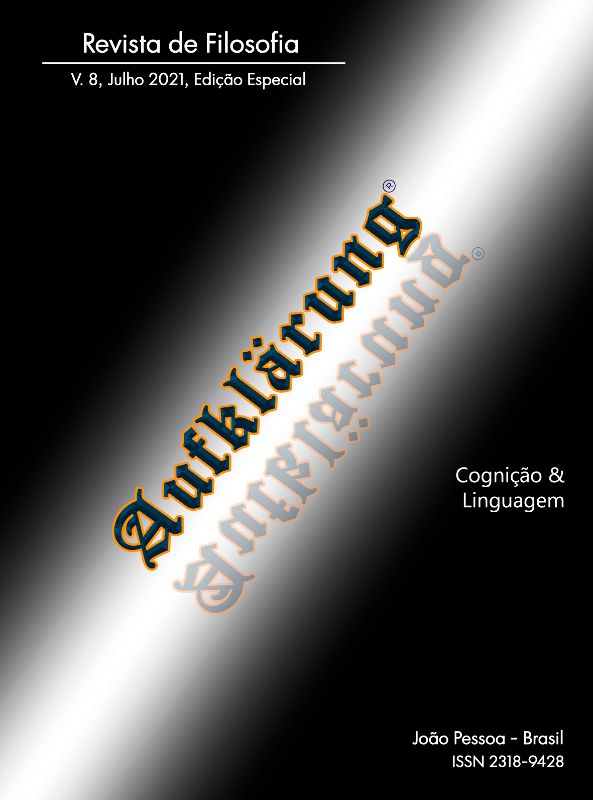The mind extended beyond discourse: the virtual public sphere as cognitive technology
DOI:
https://doi.org/10.18012/arf.v8iesp.60014Keywords:
extended mind, public virtual sphere, embodied embedded cognitionAbstract
The article promotes interfaces between areas of knowledge generally disconnected, proposing a trans-Habermasian point of view about the public sphere. The objective is to think about political formation and its interface with the virtual public sphere from two argumentative paths. The first one, against Habermas himself, presents the virtual public sphere as cognitive technology following the theory of the extended mind (CHALMERS and CLARK, 1998). The second argument defends the idea that the current political formation must be understood under two axes: from the effects of meaning, related to the hermeneutics of discourse, where it is possible to insert Habermas himself; and the presence effects, which in dialogue with the non-hermeneutic field, call attention to the very presence of these cognitive technologies and their unfolding in social and political cognition today.
Downloads
References
AVRITZER, L. & COSTA, S. Teoria crítica, democracia e esfera pública: concepções e usos na América Latina. In: Dados, Revista de Ciências Sociais, Rio de Janeiro, vol.47, nº4, 2004. p.703-728.
BæRENTJEN, K. & TRETTVIK, J._An Activity Theory Approach to Affordance. In O. Bertelsen, S. Bødker, & K. Kuuti (Eds.),_Nordichi Proceedings of the Second Nordic Conference on Human-Computer Interaction, Dinamarca,_2002. p. 51-60.
CALHOUN, C. Habermas and the public sphere. In: Habermas and the public sphere, The Mit Press, Cambridge, Massachusetts, and, London, England, 1992. p.1-50.
CLARK, A. Being there: putting brain, body, and world together again. The Mit Press, Cambridge, Massachusetts, and, London, England, Kindle Edition: posição 1 a 3277, 1997.
CLARK, A. & CHALMER`S. D. The Extended Mind. Analysis, n. 58, p.10-23, 1998.
FRASER, N. Rethinking the Public Sphere: A Contribution to the Critique of Actually Existing Democracy. In: Habermas and the public sphere, The Mit Press, Cambridge, Massachusetts, and, London, England, 1992. p.109-144.
GALLAGHER, S. The socially extended mind. Cognitive Systems Research 25-26, p. 4-12, 2013.
GUMBRECHT, H. U. Produção de presença: o que o sentido não consegue transmitir. Trad: Ana Isabel Soares. Rio de Janeiro: Contraponto; Editora PUC-Rio, 206p, 2010
HABERMAS, J. Mudança Estrutural da Esfera Pública: Investigações Quanto a uma Categoria da Sociedade Burguesa. Rio de Janeiro: Tempo Brasileiro, 398p. 2003.
HABERMAS, J. Political Communication of Normative Theory on Empirical Research in Media Society: Does Democracy Still Enjoy an Epistemic Dimension? Communication Theory, n. 16, p. 411–426, 2006.
HABERMAS, J. Teoria do Agir Comunicativo (2vol). São Paulo: Martins Fontes, 1º edição, 2012.
LUBENOW, J. A. A categoria de esfera pública em Jürgen Habermas. 29/03/2007. 257p. Tese de Doutorado: Instituto de Filosofia e Ciências Humanas. Universidade Estadual de Campinas. Campinas, São Paulo, 2007.
NÖE, A. Varieties of presence. Harvard: University Press. Kindle Edition: posição 1 a 3793, 2012.
PINTO, C. M. A mente estendida além do discurso: um olhar trans-habermasiano à esfera pública. 1ºedição. Editora CRV, Curitiba, 222p. 2019.
SHAPIRO, L. A. (Editor.). The Routledge Handbook of Embodied Cognition. Kindle edition. Posição 1 a 1097, 2014.
SMART, P. The Web-extended mind. In: Metaphilosophy, v.43, n.4, p.446-463, 2012.
TEIXEIRA, J. F. Filosofia da Mente. Coleção: Como ler Filosofia. Editora Paulus. Kindle edition: Posição 1 a 801, 2014.
Additional Files
Published
How to Cite
Issue
Section
License

This work is licensed under a Creative Commons Attribution 4.0 International License.
Journal general policy
1.This journal works under a Creative Commons License aplied to online journals. That icence can be read in the following link: Creative Commons Attribution 4.0 International (CC BY 4.0).
2.Accordingly to this License, a)the journal declares that authors hold the copyright of their articles without restrictions, and they can archieve them as post-print elsewhere. b)the journal allow the author(s) to retain publishing rights without restrictions.
Metadata Policy for information describing items in the repository
1. Anyone may access the metadata free of charge at anytime.
2.The metadata may be re-used in any medium without prior permission, even commercial purposes provided the OAI Identifier or a link to the original metadata record are given, under the terms of a CC BY license refered for the Journal.







































